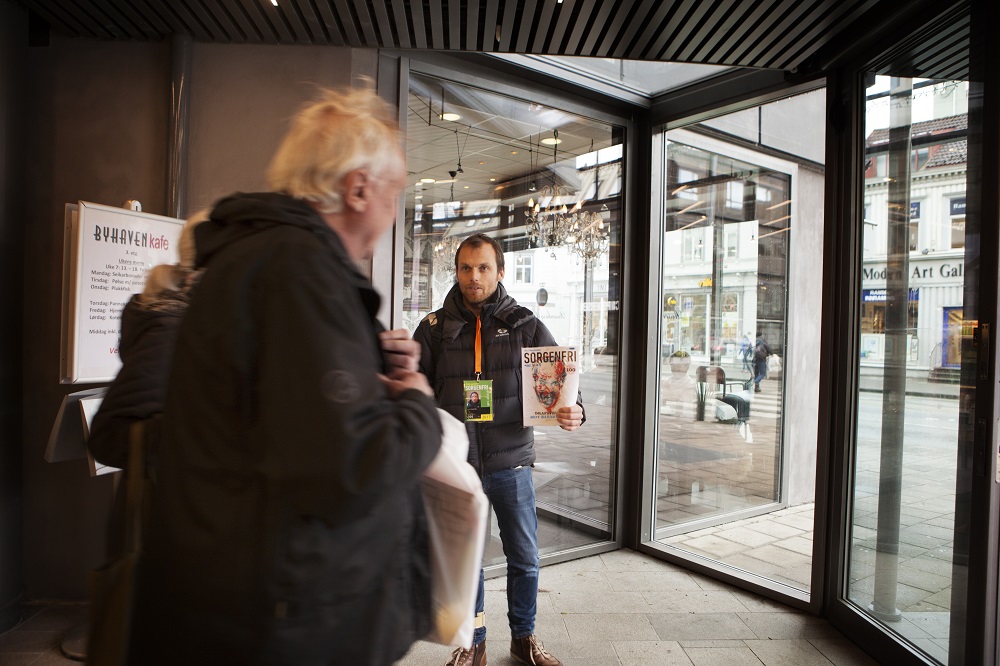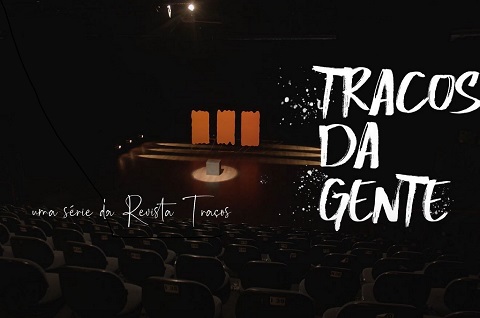By Trond Ola Tilseth, Sorgenfri
“How would you handle being a vendor of Sorgenfri for a day?” asked one of our vendors on a morning in March this year. I was behind the counter listening distractedly to the general discontent being voiced about the work situation on the streets. Several vendors pointed out their declining sales, long days with lots of waiting, and chilly temperatures, both in the air and in the faces of the people of Trondheim.
I tried to cheer them up saying “sales vary” and “things will improve.” I didn’t convince anyone.
Then I was challenged: Get out on the streets and try for yourself, a vendor said.
I couldn’t say no.
Here’s my report:
08.10: I’m waiting for the bus with a thick knitted hat and a parka patched with duct tape. My wife hates this jacket. But there is sleet in the air, so I insisted. I am wearing nothing that identifies me as a Sorgenfri vendor yet. Still, I imagine that a woman at the bus stop gives me an encouraging look.
08.30: The role swap starts in the Sorgenfri distribution centre. I get handed a vendors’ card and am ready for the lottery that decides sellers’ placement for the day. The other vendors quickly take me into the fold. Robert and Jon Øyvind give me sales tips.
08.45: A vendor tells me that the police are running a campaign against civil disturbances. “They search addicts and take away the user doses that are supposed to keep us healthy. Three times this week, I’ve been fined 3000 kroner for possession of one dolcontin.”
08.50: “It’s the end of the month, so prepare for somewhat slow sales,” Kay Robin tells me. “Last year, we sold out the issues for January and February. This year, sales have been poor.”

09.00: The lottery for vendors’ placements takes place. I wanted the pharmacy on the market square, but lost the spot to the guy drawn before me. He recommends that I take Byhaven instead, and says: “I would have gone there myself. But I’m banned from there because of an accusation of theft. ”
09.10: I borrow four magazines from the distribution centre. This leaves me with a debt of 200 kroner owed to Sorgenfri.
09.25: After ten minutes in front of the main entrance to the Byhaven department store, I realise I’ve made a classic mistake: I’m not holding up the magazine. Holding it up high, my experience suddenly feels more real. And burdensome. ‘Buy Sorgenfri!’ I call. My voice is trembling.
09.26: I worry about coming face to face with people I know, more so than with complete strangers. I am ashamed that I find it shameful to be a Sorgenfri seller.
09.40: My first sale. A mother and daughter buy a magazine after passing me twice in ten minutes. They pay via text message.
09.42: An older woman approaching the entrance nods at me and smiles when I ask if she wants to buy this month’s edition of Sorgenfri. She doesn’t want a magazine, though. Still, it’s nice.
09.54: Not everyone’s friendly, even when I take care to use a friendly tone. Perhaps they don’t want to be. Or maybe they don’t know how.
Get out on the streets and try for yourself, a vendor said. I couldn’t say no.
10.03: I notice there are many ways that people avoid seeing me. I’ve probably done the same thing myself when walking past vitamin sellers, Amnesty workers and phone plan pushers.
10.05: It starts snowing. The weather makes it easy for members of the public to hide under an umbrella when passing someone like me.
10.13: “Please buy ‘Sorgenfri’!” I call out. A guy stares at the magazine as if it has just spat at him. He grunts and walks away. ‘I hope you fall flat on your face,’ I snarl, but only to myself. What I really say, in as friendly a way as I can, is ‘Have a nice day!’
10.17: I’m craving a cigarette. Then I remember that I don’t smoke.
10.18: A bareheaded man accompanied by a behatted woman states that he doesn’t need to buy ‘Sorgenfri’, as he already lives at ‘Sorgenfri’. Is it like Obelix not needing to drink the magic potion, since he fell into the cauldron as a child?
10.20: A former colleague from the newspaper, Ingrid Skjøtskift–now a chairperson for the local government administration–doesn’t recognise me as she disappears through the doors of the department store. ‘Hi, Ingrid’! I greet her when she comes back. This time, she buys an issue.
10.21: Making a sale is like an injection of energy. I’m suddenly in a great mood and feel really uplifted. I’m also debt-free. Whatever I sell from now on is pure profit.
10.39: It’s getting colder. I retreat just inside the doors. It’s warm enough that I take my woollen cap off.
‘Buy Sorgenfri!’ I call. My voice is trembling.
10.41. A man in his fifties declines to buy an issue and goes on to explain why. ‘I can’t read. Letters are just a blur for me now. I have problems with my eyes. It’s been years since I’ve read the papers. It’s hard.’
10.42: The security guard stops by to check that the number and name on my sales ID matches up with the information he has from the Sorgenfri central office.
10.50: ‘Sorgenfri?’ I ask people as they pass. A sinister type with long, greasy hair looks at me like I’ve just suggested that we share a room for the night. ‘How about some “riverts”?’ he asks. Alarmed, I think it’s slang for some sort of wedgie–slap combination. Then I realise it’s short for ‘Rivotril’; epilepsy medication favoured by heavy drug users. I decline.
10.52: It’s tiring, acutally, to stand for such a long time. I’m glad I’m not a drug addict and that I don’t have other health problems.
11.25: The woman who promised to come back to buy an issue must have taken another way out. I go to lunch at Hveita, a Salvation Army Day Centre.
11.37: ‘One pound is fine, love,’ says the lady behind the counter. I am given three slices of bread for free, with Norwegian goats’ cheese, Gouda and smoked ham.
11.38 There’s a two-man band giving a concert. Sigurd uses his lips, cheeks and vocal cords to make sounds: bass guitar, snare drum, birds, planes and synthesizers. The other, somewhat hippie looking guy, named ‘The Rest’, has pigtails and a guitar. The surreal lyrics are packed with gangster slang, knife references and crude language. The ladies at the Salvation Army seem thrilled.
12.30: On my way back to Byhaven, I almost run into three policemen. Knowing about the ongoing police campaign, I make myself scarce.
12.40: With some people, you just know there’s no point in asking if they want to buy an issue. They pass quickly, eyes looking elsewhere, an anti-social expression around their mouth.
12.52: A woman wants to tip me £2.50. I decline. She insists. Her daughter was a drug addict, dying tragically when she was only 20 years old. ‘Everyone has baggage. We have no right to judge others,’ she tells me.
13.05: Several people, especially older women, nod and smile at me. Isn’t that nice? But none of them buys a magazine.
13.12: A longhaired young man with bleary eyes tells me that I deserve the utmost respect. The bigwigs should learn from me, he says solemnly.
13.14: A woman stares at me, then turns around rapidly. Perhaps I remind her of something she was supposed to do.
13.44: A former Sorgenfri seller walks through the door. She leans her 62 heavy years on a walker. She’s afraid to return to her apartment because there was a break-in. Today’s plan: Take the night train to Bodø. Tomorrow is uncertain. She must try to keep warm as best she can until the train leaves at 11 pm.
Everyone has baggage. We have no right to judge others.
14.20: A grandmotherly woman, nicely dressed, comes running, yelling that she needs a chair. She falls over the walker of the former ’Sorgenfri’ seller and smashes into the glass wall between the entrance of the department store and the bakery. She raises her hands to her head and shuts her eyes to protect herself. She is pale, but not bleeding.
‘Should I call an ambulance?’ I ask her, offering to help.
‘No, I’m fine. It’s kind of you. May I have a hug?’
‘Yes, of course.’
‘A sudden drop in blood pressure,’ she tells me. ‘And I have been drinking. You probably know how it is?’
15:00: I decide to stop selling the magazine for the day, with even greater respect for the sellers of ’Sorgenfri’ than before. I know that many of them will go out again after 3 pm.
The Next Day
At the distribution centre, I run into fellow seller Robert Høst.
‘How many magazines did you sell?’ he asks me.
‘Nine’.
He chuckles.
‘Not bad. Half as many as me’.
Translated from Norwegian by Anne Kristoffersen




















